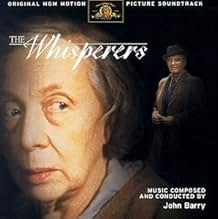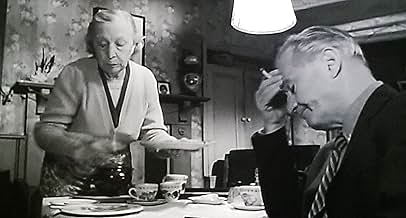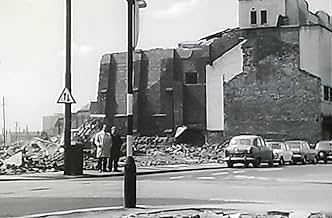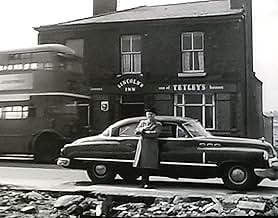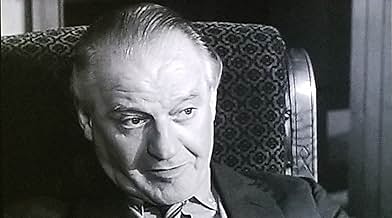AVALIAÇÃO DA IMDb
7,1/10
1,6 mil
SUA AVALIAÇÃO
Adicionar um enredo no seu idiomaA lonely elderly Englishwoman talks to herself and hears voices talking about her.A lonely elderly Englishwoman talks to herself and hears voices talking about her.A lonely elderly Englishwoman talks to herself and hears voices talking about her.
- Direção
- Roteiristas
- Artistas
- Indicado a 1 Oscar
- 9 vitórias e 4 indicações no total
- Direção
- Roteiristas
- Elenco e equipe completos
- Produção, bilheteria e muito mais no IMDbPro
Avaliações em destaque
Somerset Maugham once made this observation about poverty: "You will hear people say that poverty is the best spur to the artist. They have never felt the iron of it in their flesh. They do not know how mean it makes you. It exposes you to endless humiliation, it cuts your wings, it eats into your soul like a cancer."
The spirit of what he said pervades this disturbing film. No doubt this work would have to resonate more in Britain, but even 50-years later, unemployment, abandonment of the elderly, and welfare subsistence are fairly universal maladies of the Western World.
"The Whisperers" is not a comfortable experience. A disturbed old woman, Mrs Ross (Edith Evans), who lives alone is slowly losing her grip on reality, she lives in impoverished circumstances and is dependent on welfare. When she accidentally comes into a little money, she is preyed on like a wounded animal in the jungle. Even her son, Charlie (Ronald Fraser), and her estranged husband, Archie (Eric Portman), take advantage of her.
This is more than a performance by Edith Evans; when it's over, you believe Mrs Ross existed.
She lives in a society where ruthless opportunists abound. However, the story is not devoid of decent people; her young neighbour and especially the understanding Mr Conrad (Gerald Sim) at the welfare office redeem what would be a very jaundiced look at modern life.
Bryan Forbes was a man of many talents: actor, writer and director, but this film would have to be at the pinnacle of his achievements. The film boasts brilliant photography and real locations. You can almost smell the rising damp and cheap tobacco, and feel the mud spattered on your shoes - not to mention the edge of the cut-throat razors in one disturbing scene; powerful imagery in the impressive tradition of British 'kitchen sink dramas'.
The film has a score by John Barry. Although I didn't see this film until 50 years after it was made, I knew the theme far earlier from a Barry compilation album, and always wanted to see the film it went with. This was before Barry settled into that languid style when many of his scores seemed interchangeable. During the 60's and 70's he was one of the most experimental composers. He used a harpsichord here in a small-scale work, which suited the poignancy and bleakness of the story.
Although dramatised, the film shows a slice of modern life, but from a rather dispassionate point-of-view and that makes it hit home all the more.
The spirit of what he said pervades this disturbing film. No doubt this work would have to resonate more in Britain, but even 50-years later, unemployment, abandonment of the elderly, and welfare subsistence are fairly universal maladies of the Western World.
"The Whisperers" is not a comfortable experience. A disturbed old woman, Mrs Ross (Edith Evans), who lives alone is slowly losing her grip on reality, she lives in impoverished circumstances and is dependent on welfare. When she accidentally comes into a little money, she is preyed on like a wounded animal in the jungle. Even her son, Charlie (Ronald Fraser), and her estranged husband, Archie (Eric Portman), take advantage of her.
This is more than a performance by Edith Evans; when it's over, you believe Mrs Ross existed.
She lives in a society where ruthless opportunists abound. However, the story is not devoid of decent people; her young neighbour and especially the understanding Mr Conrad (Gerald Sim) at the welfare office redeem what would be a very jaundiced look at modern life.
Bryan Forbes was a man of many talents: actor, writer and director, but this film would have to be at the pinnacle of his achievements. The film boasts brilliant photography and real locations. You can almost smell the rising damp and cheap tobacco, and feel the mud spattered on your shoes - not to mention the edge of the cut-throat razors in one disturbing scene; powerful imagery in the impressive tradition of British 'kitchen sink dramas'.
The film has a score by John Barry. Although I didn't see this film until 50 years after it was made, I knew the theme far earlier from a Barry compilation album, and always wanted to see the film it went with. This was before Barry settled into that languid style when many of his scores seemed interchangeable. During the 60's and 70's he was one of the most experimental composers. He used a harpsichord here in a small-scale work, which suited the poignancy and bleakness of the story.
Although dramatised, the film shows a slice of modern life, but from a rather dispassionate point-of-view and that makes it hit home all the more.
This grim tale about the loneliness and vulnerability of old age, set in what must be the most rundown section of Manchester, manages to touch us in an unsentimental manner. Its chief quality is the crisply photographed slum in which it largely takes place, like the last remains of the 19th century surviving into the post-War 20th. The protagonist, Margaret Ross, played by the stately Edith Evans, lives in a cluttered ground floor flat in this urban wasteland of rain-slicked cobblestone streets without cars or pedestrians, but an abundance of crumbling brick walls, gutted buildings and stray cats. The opening credit sequence of grey rooftops under rainy skies is particularly striking.
At home she looks through newspapers, eats bread with honey, sips tea and listens to radio as her sink faucet drips, drips, drips. She constantly hears voices (the "whisperers" of the title) and turns up the radio to drown them out. When the upstairs neighbors, an interracial couple with an infant, pound on the floor in protest, she pounds back on the ceiling with a broomstick and is showered with bits of plaster. (We see the bald patch from where the plaster has fallen but the absence of other patches means that she has never before banged on the ceiling; this strand of the story would have been more convincing if more of the ceiling was similarly defaced.) When not talking to the imagined voices, she spends her solitary life visiting the library where she surreptitiously warms her feet on the heating pipes, collecting welfare from a local government office where she makes frequent references to her good breeding and high-class family connections, listening to sermons at a local evangelical storefront chapel, and tending to household chores which seem to consist mostly of emptying large quantities of dust, coal ashes and bottles and cans from which she derives most of her nourishment.
Evans brings dignity to the role but somehow she does not seem to be the right actress for the part. Margaret Ross is a woman of humble origins. Evans is a thoroughbred. True, she does claim that she married beneath herself, but that would be putting it mildly. Still, she has the acting skills to keep us entertained, and she gets brilliant support from the secondary players: Eric Portman as her surly husband, Avis Bunnage as a predatory welfare mom and Gerald Sim as a welfare clerk add a great deal to the overall presentation. Leonard Rossiter, too, shows up for a strong few minutes as a government official. And John Barry supplies a melancholy but unobtrusive musical score.
Evans got an Oscar nomination for this performance. Fair enough. But I think Gerry Turpin should have also gotten one for his beautiful cinematography.
At home she looks through newspapers, eats bread with honey, sips tea and listens to radio as her sink faucet drips, drips, drips. She constantly hears voices (the "whisperers" of the title) and turns up the radio to drown them out. When the upstairs neighbors, an interracial couple with an infant, pound on the floor in protest, she pounds back on the ceiling with a broomstick and is showered with bits of plaster. (We see the bald patch from where the plaster has fallen but the absence of other patches means that she has never before banged on the ceiling; this strand of the story would have been more convincing if more of the ceiling was similarly defaced.) When not talking to the imagined voices, she spends her solitary life visiting the library where she surreptitiously warms her feet on the heating pipes, collecting welfare from a local government office where she makes frequent references to her good breeding and high-class family connections, listening to sermons at a local evangelical storefront chapel, and tending to household chores which seem to consist mostly of emptying large quantities of dust, coal ashes and bottles and cans from which she derives most of her nourishment.
Evans brings dignity to the role but somehow she does not seem to be the right actress for the part. Margaret Ross is a woman of humble origins. Evans is a thoroughbred. True, she does claim that she married beneath herself, but that would be putting it mildly. Still, she has the acting skills to keep us entertained, and she gets brilliant support from the secondary players: Eric Portman as her surly husband, Avis Bunnage as a predatory welfare mom and Gerald Sim as a welfare clerk add a great deal to the overall presentation. Leonard Rossiter, too, shows up for a strong few minutes as a government official. And John Barry supplies a melancholy but unobtrusive musical score.
Evans got an Oscar nomination for this performance. Fair enough. But I think Gerry Turpin should have also gotten one for his beautiful cinematography.
this is a great performance another example of the academy awards not giving it to the rightful owner...i love kate hepburn but lets face it THIS performance deserved it...this is one of thoses performances that you are so grateful that film can perserve...edith evans is so great and yet so sad in the starring role... it is a most depressing film and one that is not to be seen if one is depressed but for an actor to see a great actress in her glory this is one of those experiences indeed...i always admired edith evans but never more than in this picture..of aging and how awful it can be to anyone so treat yourself to an unusual experience and see the whispers...
Dame Edith Evans is a knockout playing Mrs. Ross, a lone old woman who not only hears whispering but believes it to be voices talking to her from inside her radio, and not the broadcast. She believes the voices to be hostile. We therefore see that she is losing grip as time wears on and she lives her solitary life. This movie is great, strong and sad. Turns out the reason she's on her own is that both her husband and her son are rats. One gets imprisoned and one is a drunk living in an SRO. It's her son who's imprisoned but not before he leaves a stash of cash in her hoarder-house. Well. We've all certainly seen enough movies to know that cash can only bring trouble, which it does in the form of Avis Bunnage, who delivers another power performance as the ne'er-do-well who finds Mrs. Ross and takes her home. Alas, the treatment of this woman who is well and truly alone will break your heart.
First off, I want to say that I am drawn to movies that have, at their core, a genuine feeling of sadness for humanity. It's not so much that these films offer a pessimistic view of the world - although, I guess you can label it that way - as they just seem to have a clear understanding of the horribly awful things we often do to one another.
Shot in black and white, in perpetually fogged out/drizzly England, this story of one older woman's loneliness and dementia tinged world is about 5 steps down into the dungeon of depressing. It offers a kind of sad relief - the kind that comes from knowing that, although things are terrible, they could be much, much worse.
I've always been one to not quite understand the desire for a "feel good" movie. All movies, if they work as they should, will leave you feeling better for having seen them - whether silly or serious. This is one of those films.
Shot in black and white, in perpetually fogged out/drizzly England, this story of one older woman's loneliness and dementia tinged world is about 5 steps down into the dungeon of depressing. It offers a kind of sad relief - the kind that comes from knowing that, although things are terrible, they could be much, much worse.
I've always been one to not quite understand the desire for a "feel good" movie. All movies, if they work as they should, will leave you feeling better for having seen them - whether silly or serious. This is one of those films.
Você sabia?
- CuriosidadesThe director Bryan Forbes and Nanette Newman, who played the upstairs neighbor, were husband and wife.
- Erros de gravaçãoThe old kitchen curtain is shown in scene after Archie leaves, while Margaret is moping around the apartment. The new curtains are shown again after she returns from seeing Mr. Conrad at the National Assistance Board.
- Citações
Archie Ross: What kind of job might it be, sir?
Mr. Conrad: Doorman at a cinema.
Archie Ross: Oh, wonderful. Nice and healthy and in the open.
Mr. Conrad: The healthiest jobs, Mr. Ross, are the ones you keep.
- ConexõesVersion of ITV Play of the Week: The Whisperers (1961)
- Trilhas sonorasShall We Gather at the River?
(uncredited)
Written by Robert Lowry
Performed by Edith Evans and mission attendees
Principais escolhas
Faça login para avaliar e ver a lista de recomendações personalizadas
- How long is The Whisperers?Fornecido pela Alexa
Detalhes
- Tempo de duração1 hora 46 minutos
- Cor
- Mixagem de som
- Proporção
- 1.66 : 1
Contribua para esta página
Sugerir uma alteração ou adicionar conteúdo ausente

Principal brecha
By what name was The Whisperers (1967) officially released in Canada in English?
Responda

